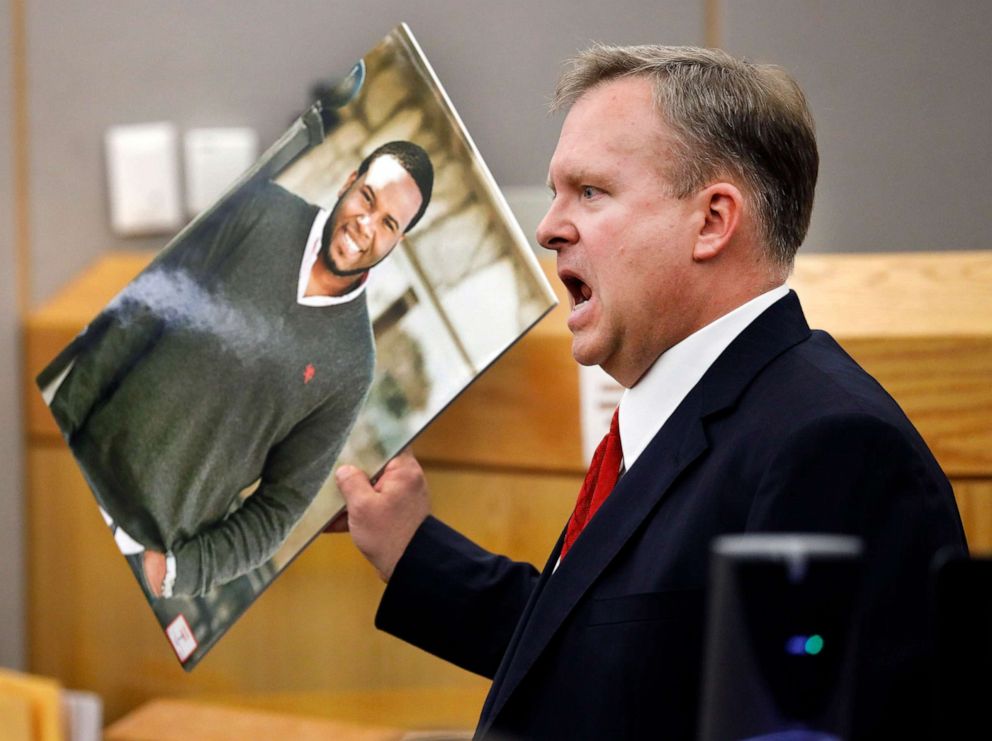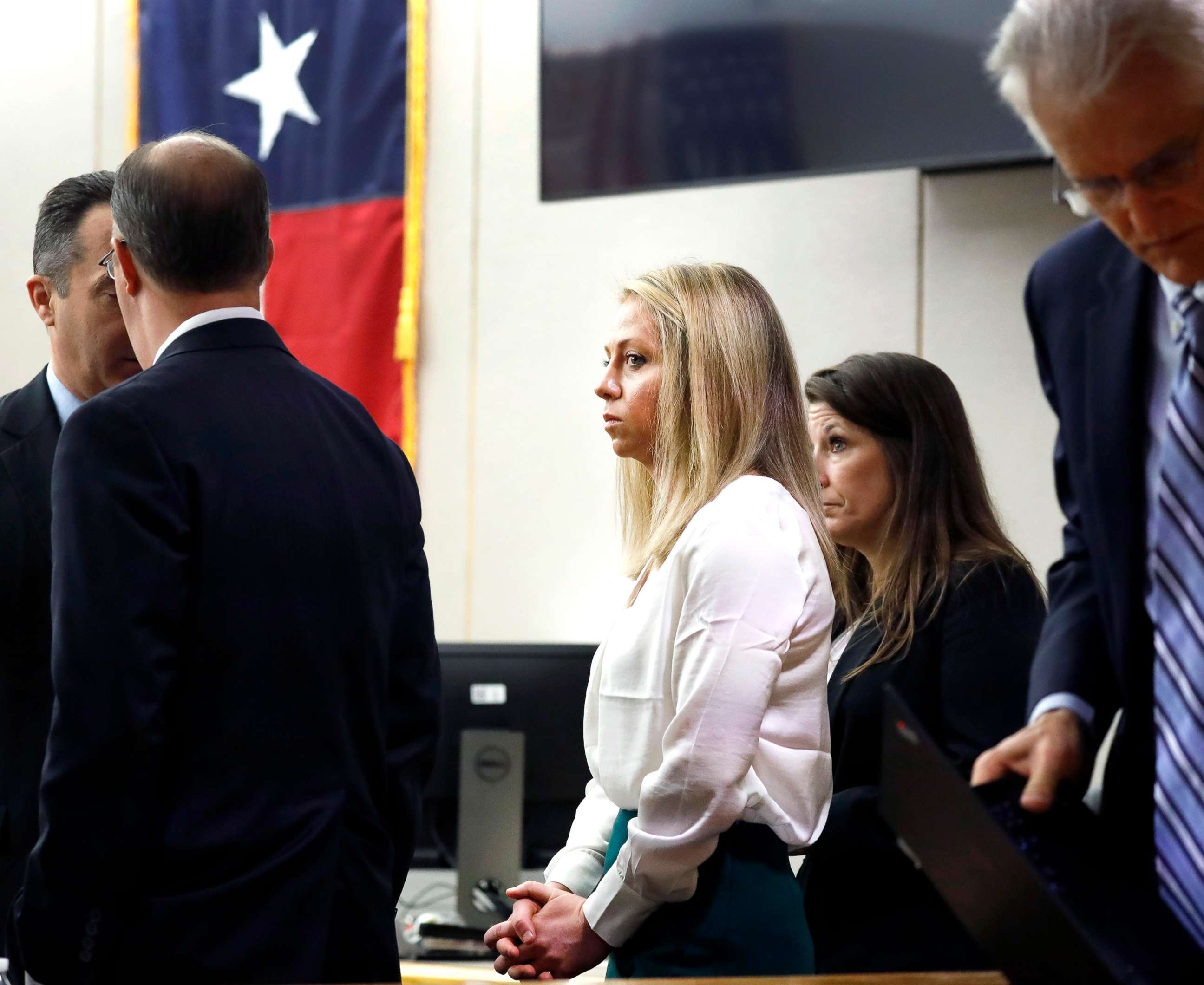Author of Texas 'Castle Doctrine' self-defense law says it wasn't designed for defendants like Amber Guyger
Former police officer Amber Guyger used the 'Castle Doctrine' in her defense.
The former Texas lawmaker who wrote the state's "Castle Doctrine" self-defense law said it "wasn't designed" to be used to defend people like former Dallas police officer Amber Guyger, who was convicted of murder Tuesday for fatally shooting an innocent man in an apartment she thought was her own.
Former Texas state Sen. Jeff Wentworth, a Republican, told ABC News that he drafted the "Castle Doctrine" 12 years ago to provide protection to citizens who use lethal force to defend themselves against intruders into their own homes.
In Guyger's use of the law, which is similar to Florida's "stand your ground" self-defense law, she claimed she believed she was in her own apartment when she mistakenly entered the unit of 26-year-old Botham Jean, who lived a floor above her at the South Side Flats apartment complex in Dallas and shot him to death after wrongly suspecting him of being a burglar.

"It was designed for you in your home. It wasn't designed for this kind of circumstance that existed in this Dallas case," Wentworth, now a justice of the peace in San Antonio, told ABC News following Guyger's conviction on Tuesday.
Dallas District Court Judge Tammy Kemp, who presided over Guyger's trial, instructed the jury that they could consider the "Castle Doctrine" in deciding its verdict.
The jury ended up rejecting the defense and convicted Guyger of murder after less than two days of deliberations.
"Clearly, I don't think anybody anticipated, I certainly did not, that someone would shoot and kill someone in their own house believing that they were in their own," Wentworth said. "I mean that's just a circumstance I don't think anybody had thought of. I can say that I didn't foresee this kind of situation. No."
Wentworth used the term "Castle Doctrine" to refer to his Senate Bill 378, meaning if a person is in their “castle” -- or home, apartment, business or even their car -- the use of deadly force is presumed to be reasonable. Former Texas Gov. Rick Perry signed the bill into law in 2007.

"I don't criticize the judge for saying in this instance it was allowable for the jury to consider because if, in fact, the woman (Guyger) truly believed that she was in her house defending herself from an intruder, it would have been an appropriate use. Apparently the jury didn't buy that story," Wentworth said.
He said he wrote the legislation after reading a newspaper article about former Florida Gov. Jeb Bush signing that state's "stand your ground" law.
"I thought to myself, 'Well, isn't that amazing that Floridians haven't had this right that we here in Texas have had for decades.' And then I thought, 'You know, I'd better double-check," Wentworth said.
When he went back and checked for such a law, he said he was "shocked" to learn he was wrong and that Texas did not have such a statute.
"Over the years, either through legislative action or court cases, we had lost that right to defend ourselves in our own homes and that, in fact, we had a duty to retreat," Wentworth said. "That just genuinely offended me because, you know, if I'm sitting with my family in my house watching the news at 10 o'clock at night and somebody's bashing in the front door with a crowbar, I shouldn't have to have a duty to retreat."
The "Castle Doctrine" defense was used successfully in January when a homeowner in Corpus Christi, Texas, shot and killed a suspect who had broken into his home, according to a report by ABC affiliate station WFAA-TV in Dallas. The 41-year-old homeowner invoked the "Castle Doctrine," telling police he feared for his life. He was not charged with a crime, officials said.
In June 2010, the owner of a taco truck fatally shot a man who allegedly stole a tip jar from his truck and started to run away. The case was ruled a justifiable homicide after the taco truck owner invoked the "Castle Doctrine," the Houston Chronicle reported.
One of the most famous "Castle Doctrine" cases came shortly after the law was passed in Texas when a homeowner in Pasadena, Texas, named Joe Horn fatally shot two burglars in the back after he spotted them allegedly breaking into his neighbor's house and despite a 911 dispatcher telling him repeatedly not to intervene. The Harris County District Attorney's Office presented the case to a grand jury that declined to indict Horn.
In other Texas cases, the law did not apply. In June 2012, a jury convicted a man of killing his neighbor during a confrontation over loud music, rejecting a claim that he was within his rights to fatally shoot the man under the "Castle Doctrine." A jury rejected the defense by retired Houston firefighter Raul Rodriguez, who went to his neighbor's house to complain about the noise and ended up killing the man.
Rodriguez was sentenced to life in prison.




